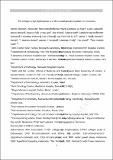Collagen Prolyl Hydroxylases Are Bifunctional Growth Regulators in Melanoma
Author(s)
Atkinson, Aithne; Renziehausen, Alexander; Wang, Hexiao; Lo Nigro, Cristiana; Lattanzio, Laura; Merlano, Marco; Rao, Bhavya; Weir, Lynda; Evans, Alan; Matin, Rubeta; Harwood, Catherine; Szlosarek, Peter; Pickering, J Geoffrey; Fleming, Colin; Sim, Van Ren; Li, Su; Vasta, James T.; Raines, Ronald T; Boniol, Mathieu; Thompson, Alastair; Proby, Charlotte; Crook, Tim; Syed, Nelofer; ... Show more Show less
DownloadAccepted version (394.9Kb)
Terms of use
Metadata
Show full item recordAbstract
Appropriate post-translational processing of collagen requires prolyl hydroxylation, catalyzed by collagen prolyl 3-hydroxylase and collagen prolyl 4-hydroxylase, and is essential for normal cell function. Here we have investigated the expression, transcriptional regulation, and function of the collagen prolyl 3-hydroxylase and collagen prolyl 4-hydroxylase families in melanoma. We show that the collagen prolyl 3-hydroxylase family exemplified by Leprel1 and Leprel2 is subject to methylation-dependent transcriptional silencing in primary and metastatic melanoma consistent with a tumor suppressor function. In contrast, although there is transcriptional silencing of P4HA3 in a subset of melanomas, the collagen prolyl 4-hydroxylase family members P4HA1, P4HA2, and P4HA3 are often overexpressed in melanoma, expression being prognostic of worse clinical outcomes. Consistent with tumor suppressor function, ectopic expression of Leprel1 and Leprel2 inhibits melanoma proliferation, whereas P4HA2 and P4HA3 increase proliferation, and particularly invasiveness, of melanoma cells. Pharmacological inhibition with multiple selective collagen prolyl 4-hydroxylase inhibitors reduces proliferation and inhibits invasiveness of melanoma cells. Together, our data identify the collagen prolyl 3-hydroxylase and collagen prolyl 4-hydroxylase families as potentially important regulators of melanoma growth and invasiveness and suggest that selective inhibition of collagen prolyl 4-hydroxylase is an attractive strategy to reduce the invasive properties of melanoma cells.
Date issued
2018-11-16Department
Massachusetts Institute of Technology. Department of ChemistryJournal
Journal of Investigative Dermatology
Publisher
Elsevier Science Ltd.
Citation
Atkinson, Aithne et al. "Collagen Prolyl Hydroxylases Are Bifunctional Growth Regulators in Melanoma." Journal of Investigative Dermatology, 139, 5, (May 2019): 1118-1126 © 2018 The Authors
Version: Author's final manuscript
ISSN
0022-202X
1523-1747
Keywords
Cell Biology, Biochemistry, Molecular Biology, Dermatology